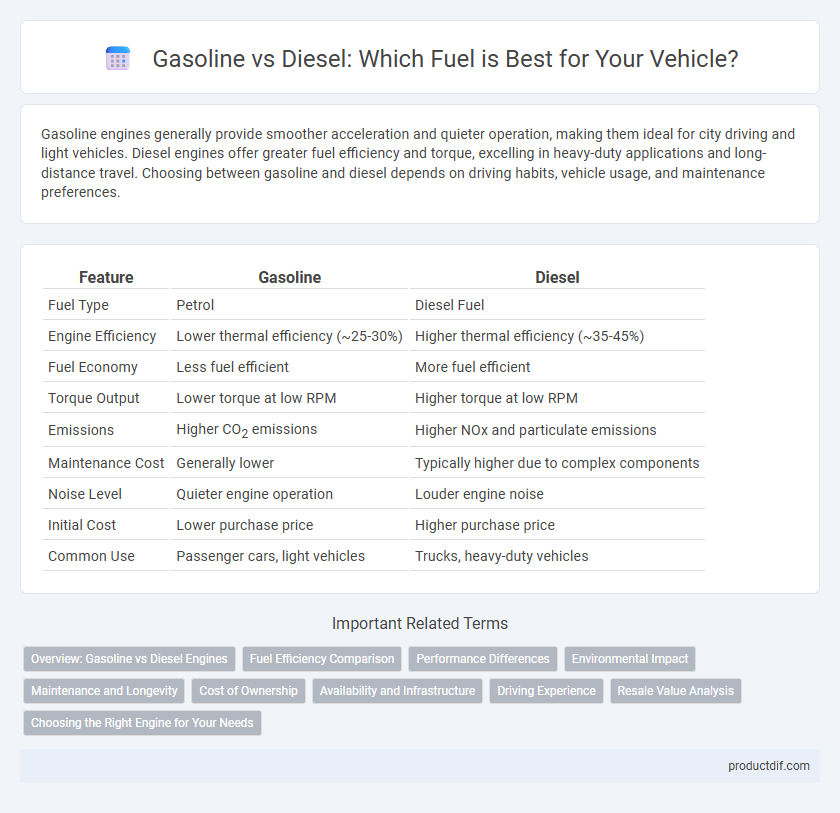Gasoline engines generally provide smoother acceleration and quieter operation, making them ideal for city driving and light vehicles. Diesel engines offer greater fuel efficiency and torque, excelling in heavy-duty applications and long-distance travel. Choosing between gasoline and diesel depends on driving habits, vehicle usage, and maintenance preferences.
Table of Comparison
| Feature | Gasoline | Diesel |
|---|---|---|
| Fuel Type | Petrol | Diesel Fuel |
| Engine Efficiency | Lower thermal efficiency (~25-30%) | Higher thermal efficiency (~35-45%) |
| Fuel Economy | Less fuel efficient | More fuel efficient |
| Torque Output | Lower torque at low RPM | Higher torque at low RPM |
| Emissions | Higher CO2 emissions | Higher NOx and particulate emissions |
| Maintenance Cost | Generally lower | Typically higher due to complex components |
| Noise Level | Quieter engine operation | Louder engine noise |
| Initial Cost | Lower purchase price | Higher purchase price |
| Common Use | Passenger cars, light vehicles | Trucks, heavy-duty vehicles |
Overview: Gasoline vs Diesel Engines
Gasoline engines operate through spark ignition, using a spark plug to ignite an air-fuel mixture, resulting in quicker combustion and higher RPM capabilities. Diesel engines rely on compression ignition, compressing air to a high temperature before injecting fuel, leading to greater fuel efficiency and higher torque output. Both engine types serve distinct vehicle needs, with gasoline engines favored for lighter vehicles and diesel engines preferred in heavy-duty applications due to durability and fuel economy.
Fuel Efficiency Comparison
Diesel engines typically offer higher fuel efficiency than gasoline engines due to their higher compression ratios and energy density, resulting in better mileage per gallon. Vehicles powered by diesel can achieve around 20-35% greater fuel economy compared to gasoline counterparts, especially during highway driving. However, fuel costs and maintenance expenses also influence the overall efficiency evaluation between gasoline and diesel vehicles.
Performance Differences
Gasoline engines generally provide higher RPMs and quicker acceleration, making them ideal for lightweight vehicles and sporty driving. Diesel engines deliver greater torque at lower RPMs, which enhances towing capacity and fuel efficiency in heavy-duty and commercial vehicles. Performance variations stem from combustion processes, with gasoline engines igniting fuel-air mixtures via spark plugs, while diesel engines rely on compression ignition for improved fuel economy and engine longevity.
Environmental Impact
Diesel engines emit lower carbon dioxide (CO2) levels compared to gasoline engines, contributing less to greenhouse gas accumulation. Gasoline vehicles produce higher amounts of carbon monoxide (CO), hydrocarbons, and nitrogen oxides (NOx), which exacerbate air pollution and smog formation. Modern diesel engines equipped with advanced particulate filters significantly reduce particulate matter emissions, mitigating one of their primary environmental concerns.
Maintenance and Longevity
Diesel engines generally require less frequent maintenance due to their robust construction and slower engine wear, often translating to longer engine longevity compared to gasoline engines. Diesel vehicles typically need regular oil changes with high-quality synthetic oil and periodic fuel filter replacements to maintain optimal performance. Gasoline engines, while needing more frequent spark plug and air filter changes, usually have lower maintenance costs but may experience shorter engine lifespans due to higher operating temperatures and increased engine speed.
Cost of Ownership
Gasoline vehicles generally have a lower upfront purchase price compared to diesel counterparts, but diesel engines offer better fuel efficiency and longer engine life, reducing overall maintenance and fuel costs. The cost of diesel fuel is often higher, yet improved mileage can offset this expense over time. Insurance and repair costs tend to be comparable, with diesel vehicles potentially incurring higher emissions-related fees depending on regional regulations.
Availability and Infrastructure
Gasoline fuel is widely available globally, supported by a comprehensive network of refueling stations in both urban and rural areas, ensuring easy access for most drivers. Diesel infrastructure, while also extensive, is more prominent in commercial and heavy-duty vehicle sectors, with a growing presence in passenger vehicles due to rising demand. Regions with strong diesel vehicle markets typically invest in maintaining and expanding diesel fueling stations, although these may be less frequent in remote or residential zones compared to gasoline outlets.
Driving Experience
Gasoline engines typically offer smoother acceleration and quieter operation, delivering a more refined driving experience ideal for urban and highway use. Diesel engines provide higher torque at lower RPMs, enhancing performance for heavy-duty vehicles and off-road driving with superior fuel efficiency. Drivers often prefer gasoline vehicles for speed and responsiveness, while diesel vehicles excel in durability and long-distance driving comfort.
Resale Value Analysis
Diesel vehicles typically retain higher resale value due to better fuel efficiency and greater durability, appealing to buyers with long-term usage in mind. Gasoline vehicles often depreciate faster, influenced by fluctuating fuel prices and higher maintenance costs over time. Market demand and regional preferences further impact the resale value gap between gasoline and diesel-powered cars.
Choosing the Right Engine for Your Needs
Gasoline engines typically offer smoother acceleration and lower upfront costs, making them ideal for city driving and shorter commutes. Diesel engines provide greater fuel efficiency and higher torque, benefiting those who require towing capacity or drive long distances frequently. Selecting the right engine depends on balancing factors such as fuel economy, maintenance costs, performance needs, and driving habits.
Gasoline vs Diesel Infographic

 productdif.com
productdif.com